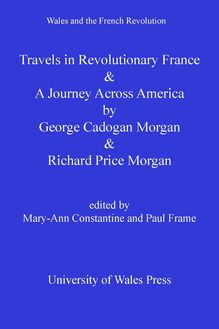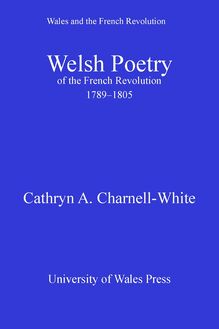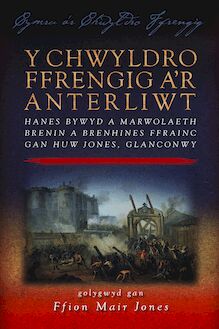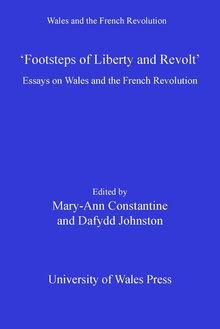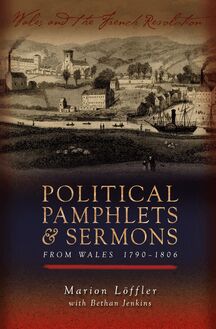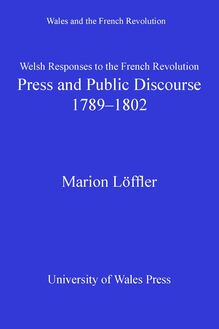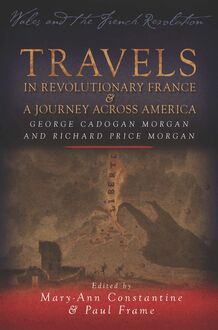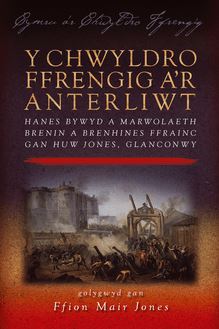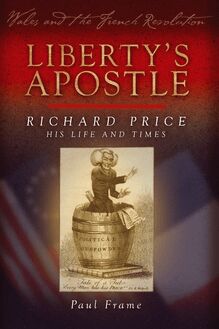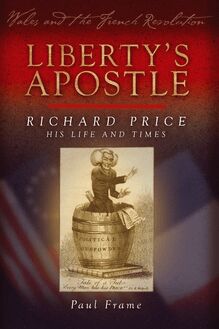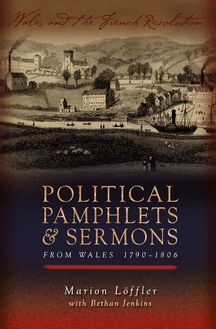-
 Univers
Univers
-
 Ebooks
Ebooks
-
 Livres audio
Livres audio
-
 Presse
Presse
-
 Podcasts
Podcasts
-
 BD
BD
-
 Documents
Documents
-
- Cours
- Révisions
- Ressources pédagogiques
- Sciences de l’éducation
- Manuels scolaires
- Langues
- Travaux de classe
- Annales de BEP
- Etudes supérieures
- Maternelle et primaire
- Fiches de lecture
- Orientation scolaire
- Méthodologie
- Corrigés de devoir
- Annales d’examens et concours
- Annales du bac
- Annales du brevet
- Rapports de stage
La lecture à portée de main
Découvre YouScribe en t'inscrivant gratuitement
Je m'inscrisPolitical Pamphlets and Sermons from Wales 1790-1806 , livre ebook
Découvre YouScribe en t'inscrivant gratuitement
Je m'inscrisEn savoir plus
En savoir plus

Description
This pioneering volume seeks to capture the excitement of the period by demonstrating how radicals and loyalists, Dissenters, Methodists and Churchmen, pacifists and warmongers engaged in a lively argument in their published works. An in-depth essay reviews and interprets texts written by artisans, Dissenting ministers, country curates and Anglican bishops, who all used religion as politics; promoted war or peace; argued over republicanism and loyalism, and utilized the law as a stage for political ideas. All texts are fully translated and thus made accessible to an English-speaking audience for the first time.
Sujets
Informations
| Publié par | University of Wales Press |
| Date de parution | 15 octobre 2014 |
| Nombre de lectures | 0 |
| EAN13 | 9781783161010 |
| Langue | English |
| Poids de l'ouvrage | 17 Mo |
Informations légales : prix de location à la page 0,0450€. Cette information est donnée uniquement à titre indicatif conformément à la législation en vigueur.
Extrait
WALES AND THE FRENCH REVOLUTION
General Editors: Mary-Ann Constantine and Dafydd JohnstonWALES AND THE FRENCH REVOLUTION
Political Pamphlets and Sermons from Wales
1790–1806
MARION LÖFFLER
with
Bethan Jenkins
UNIVERSITY OF WALES PRESS
CARDIFF
2014© Marion Löffler, 2014
All rights reserved. No part of this book may be reproduced in any material form
(including photocopying or storing it in any medium by electronic means and
whether or not transiently or incidentally to some other use of this publication)
without the written permission of the copyright owner except in accordance with
the provisions of the Copyright, Designs and Patents Act 1988. Applications for the
copyright owner’s written permission to reproduce any part of this publication should
be addressed to The University of Wales Press, 10 Columbus Walk, Brigantine Place,
Cardiff CF10 4UP.
www.uwp.co.uk
British Library Cataloguing-in-Publication Data
A catalogue record for this book is available from the British Library.
ISBN 978-1-7831-6100-3
e-ISBN 978-1-7831-6102-7
The right of Marion Löffler to be identified as author of this work has been asserted
by her in accordance with sections 77, 78 and 79 of the Copyright, Designs and
Patents Act 1988.
Typeset in Wales by Eira Fenn Gaunt, Cardiff
Printed by CPI Antony Rowe, Chippenham, WiltshireWhen twenty-six millions of men shook off the most galling and oppressive
despotism, lovers of freedom, we felt joy at so many sons being born to her.
Would not a good Christian, your Lordship for instance, rejoice, were he to
hear, that the whole empire of China was converted to the Christian faith. Of a
similar kind was our joy, on account of this event. Prizing liberty, when we saw
its votaries increase, when we saw a nation of eminent influence, of general resort,
accustomed to give the tone to the rest of Europe, a nation respectable for its
science, its arts, its letters, its polished manners, declare decidedly in its favour,
it was natural for us to feel heart-felt satisfaction.
[David Jones], The Welsh Freeholder’s Farewell Epistles to the
Right Rev. Samuel Lord Bishop (Lately, of St. David’s)
(London, 1794), pp. 38–9.
Publications against everything hitherto deemed sacred are circulated with an
industry and assurance beyond the example of former times; and to promote their
success, the titles, the size, and the style are artfully suited to readers of every
description. With what avidity such writings are sought after – what pernicious
impressions they have made upon some weak minds, and still more upon ill
disposed ones can hardly have escaped the notice of anyone who is attentive to
what is passing.
Samuel Strong, A Sermon preached at the Ordinary
Visitation of the Lord Bishop of Saint Asaph, at Wrexham
(Wrexham, 1795), pp. 21–2.WALES AND THE FRENCH REVOLUTION
The French Revolution of 1789 was perhaps the defining event of the
Romantic period in Europe. It unsettled not only the ordering of society
but language and thought itself: its effects were profoundly cultural, and
they were long-lasting. The last twenty years have radically altered our
under standing of the impact of the Revolution and its aftermath on British
culture. In literature, as critical attention has shifted from a handful of major
poets to the non-canonical edges, we can now see how the works of women
writers, self-educated authors, radical pamphleteers, prophets and loyalist
propagandists both shaped and were shaped by the language and ideas of
the period. Yet surprising gaps remain, and even recent studies of the ‘British’
reaction to the Revolution remain poorly informed about responses from
the regions. In literary and historical discussions of the so-called ‘four nations’
of Britain, Wales has been virtually invisible; many researchers working in
this period are unaware of the kinds of sources available for comparative
study.
The Wales and the French Revolution Series is the product of a four-year
project funded by the AHRC and the University of Wales at the Centre
for Advanced Welsh and Celtic Studies. It makes available a wide range of
Welsh material from the decades spanning the Revolution and the subsequent
wars with France. Each volume, edited by an expert in the field, presents a
collection of texts (including, where relevant, translations) from a particular
genre with a critical essay situating the material in its historical and literary
context. A great deal of material is published here for the first time, and all
kinds of genres are explored. From ballads and pamphlets to personal letters
and prize-winning poems, essays, journals, sermons, songs and satires, the
range of texts covered by this series is a stimulating reflection of the political
and cultural complexity of the time. We hope these volumes will encourage
scholars and students of Welsh history and literature to rediscover this
fascinating period, and will offer ample comparative scope for those working
further afield.
Mary-Ann Constantine and Dafydd Johnston
General EditorsContents
List of Figures ix
Preface xi
Translator’s Acknowledgements xv
Acknowledgements xvi
List of Abbreviations xvii
Editorial Principles xix
Political Pamphlets and Sermons from Wales 1790–1806: An Overview 1
SELECTION OF PAMPHLETS
1 [Morgan John Rhys], Cyngor Gamaliel; Neu Ddyledswydd Brydain: Mewn
Pregeth ar Ddydd Ympryd, Chwefror 28, 1794 (Caerfyrddin: Argraphwyd gan
I. Ross, yn Heol-Awst, 1794) ([Morgan John Rhys], Gamaliel’s Counsel;
Or Britain’s Duty: In a Sermon on the Fast-Day, February 28, 1794
(Carmarthen: Printed by I. Ross, in Heol-Awst, 1794)) 91
2 John Jones, Glan-y-Gors, Bardd, Seren tan Gwmmwl, Neu Ychydig Sylw
ar Frenhinoedd, Escobion, Arglwyddi &c. a Llywodraeth Lloegr yn Gyffredin. Wedi
ei ysgrifennu er mwyn y Cymru uniaith (Llundain: Argraph wyd, ac ar werth,
gan Vaughan Griffiths Rhif 169, Strand, [1795]) ( John Jones, Glan-y-Gors,
Bard, A Star under a Cloud, Or a Few Observations on Kings, Bishops,
Lords &c. and the Government of England in General. Written for the
benefit of the monolingual Welsh (London: Printed, and sold, by Vaughan
Griffiths Number 169, Strand, [1795])) 111
3 J. Jones, Glan y Gors, Toriad y Dydd; Neu Sylw Byr ar Hen Gyfreithiau ac
Arferion Llywodraethol: Ynghyd a Chrybwylliad am Freintiau Dyn, &c. Wedi ei
ysgrifennu er mwyn y Cymry uniaith (Llundain: Argraphwyd ac ar werth gan
yr Awdwr, a chan W. Baynes, Rhif 54, Paternoster-Row, 1797) ( J. Jones,
Glan y Gors, The Break of Day; Or a Brief Observation on Old Laws and
Governmental Customs: Along with a Note on the Rights of Man, &c.
Written for the benefit of the monolingual Welsh (London: Printed and
sold by the Author, and by W. Baynes, Number 54, Paternoster-Row,
1797)) 159viii CONTENTS
4 Thomas Roberts, o Lwynrhudol, Cwyn yn erbyn Gorthrymder, Yn ghyd
a Sylwiadau ar hawl Esgobion, a’u Gweinidogion i Ddegymau, &c. Wedi ei ysgrifenu
er mwyn Gwerinos Cymru (Llundain: Argraphwyd, ac ar werth gan John
Jones, Chapel-Street, Soho, [1798]) (Thomas Roberts, of Llwyn rhudol, A
Complaint against Oppression, Together with Observations on the rights
of Bishops, and their Ministers to Tithes, &c. Written for the benefit of the
Common People of Wales (London: Printed, and sold by John Jones, Chapel-
Street, Soho, [1798])) 191
5 [William Richards], Cwyn y Cystuddiedig, A Griddfanau y Carcharorion
Dieuog; Neu, Ychydig o Hanes Dyoddefiadau diweddar Thomas John a Samuel
Griffiths, y rhai wedi goddef Gorthrymder tost a Chaeth iwed caled, dros chwech neu
saith o Fisoedd yn ddi-achos, a gawsant eu rhyddhau, o’r diwedd, yn yr uchel
Eisteddfod, neu y Sessiwn mawr diweddaf, yn Hwlffordd: er dirfawr Siomedigaeth
i’w Gelynion gwaedlyd a dideimlad (Caerfyrddin: Argraph wyd gan Ioan Evans,
yn Heol y Prior, 1798) ([William Richards], The Complaint of the Afflicted,
And the Groans of the Innocent Prisoners; Or, Some of the History of the
late Sufferings of Thomas John and Samuel Griffiths, who having suffered
sore Oppression and hard Imprisonment, over the course of six or seven
Months without cause, were released at last, in the high Assembly, or the late
great Session, in Haverfordwest: to the grievous Disappointment of their
bloody and unfeeling Enemies (Carmarthen: Printed by Ioan Evans, in
Priory Street, 1798)) 235
Select Bibliography 295
Index 303Figures
Fig. 1 Evils of Schism or Drygau Sism, a bilingual poster printed
in Carmarthen, c.1805 6–7
Fig. 2 Title page of Religion in Danger by Charles Symmons
with marginalia by the the loyalist cleric Peter Bailey
Williams (Peris) noting its publication date, 7 January,
and its political character, ‘A Jacobin Pamphlet’ 36
Fig. 3 Tinted copy of the first Welsh-language political cartoon
with verse by John Jones ( Jac Glan-y-gors) published
as the frontispiece to Cwyn yn erbyn Gorthrymder by
Thomas Roberts (Llwynrhudol) in 1798 38
Fig. 4 Portrait of John Jones ( Jac Glan-y-gors), author of
Seren tan Gwmmwl and Toriad y Dydd, oil on canvas,
c.1800 56Preface
The influence of the French Revolution manifested itself in different ways
in the various parts of the British isles. In England and the Lowlands of
Scotland it engendered the ‘most fundamental debate about politics . . .
since the English civil war’, according to John Barrell. In Ireland it fanned
the flames of a struggle for independence inspired by both the American
and the French republics. Wales did not experience political mass mobilization
on anything approaching the same level and no propaganda in favour of
Welsh independence emerged. Yet the French Revolution nevertheless
furthered Welsh-language Enlightenment efforts and brought a nascent
public debate cautiously sparked by the American War of Independence to
first fruition. The main expressions of this process of cultural and political
revolution, as originally noted in R. T. Jenkins’s classic volume, Hanes Cymru
yn y Bedwaredd Ganrif ar Bymthe
-
 Univers
Univers
-
 Ebooks
Ebooks
-
 Livres audio
Livres audio
-
 Presse
Presse
-
 Podcasts
Podcasts
-
 BD
BD
-
 Documents
Documents
-
Jeunesse
-
Littérature
-
Ressources professionnelles
-
Santé et bien-être
-
Savoirs
-
Education
-
Loisirs et hobbies
-
Art, musique et cinéma
-
Actualité et débat de société
-
Jeunesse
-
Littérature
-
Ressources professionnelles
-
Santé et bien-être
-
Savoirs
-
Education
-
Loisirs et hobbies
-
Art, musique et cinéma
-
Actualité et débat de société
-
Actualités
-
Lifestyle
-
Presse jeunesse
-
Presse professionnelle
-
Pratique
-
Presse sportive
-
Presse internationale
-
Culture & Médias
-
Action et Aventures
-
Science-fiction et Fantasy
-
Société
-
Jeunesse
-
Littérature
-
Ressources professionnelles
-
Santé et bien-être
-
Savoirs
-
Education
-
Loisirs et hobbies
-
Art, musique et cinéma
-
Actualité et débat de société
- Cours
- Révisions
- Ressources pédagogiques
- Sciences de l’éducation
- Manuels scolaires
- Langues
- Travaux de classe
- Annales de BEP
- Etudes supérieures
- Maternelle et primaire
- Fiches de lecture
- Orientation scolaire
- Méthodologie
- Corrigés de devoir
- Annales d’examens et concours
- Annales du bac
- Annales du brevet
- Rapports de stage
